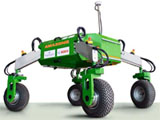Agricultural and Biological Systems Engineering, Department of

Department of Agricultural and Biological Systems Engineering: Faculty Publications
Document Type
Article
Date of this Version
2000
Abstract
The purpose of this study was to evaluate waste management practices of purchasing, handling, storage, and disposal of agricultural chemicals, petroleum products, and maintenance residuals. One-hundred surveys were returned by agricultural producers from three Nebraska counties selected based on unique environmental and waste management issues. Twenty-four questions concerning agricultural chemicals and 16 questions directed to petroleum products and maintenance residuals are discussed. A follow-up interview with 45 respondents was conducted “on-site” to gain insight into their reported practices, perceptions, and actual practices. Most farmers (66%) tended to purchase pesticides in 3.8 to 10 L (1-2.5 gal) containers and most (79%) were willing to participate in a recycling program for pesticide containers. Most of the respondents burned soft/hard plastic and paper pesticide containers, or returned the metal containers to the supplier. Few farmers took pesticide containers to landfills, or buried or stored containers in their field. Most farmers (76%) applied left-over diluted chemical residues or rinsates evenly on the field just sprayed. Eighty-one percent of the farmers stored pesticides and 89% stored fertilizers at locations greater than 31 m (101 ft) from a water source. Only 9% of the respondents indicated they had containment barriers for stationary bulk pesticides, fertilizer storage tanks, or transportable nurse tanks. Seventy-nine percent of the respondents and 84% of the interviewed farmers did not record or monitor volumes of petroleum storage. Farmers tended to have trash dumps (62%) and junk piles (57%) on their farmsteads. Geographic location within the state and size of the farmstead had an effect on whether the farms had dumps. Most farmers (94%) felt they used appropriate recycling methods to deal with waste products. However, over half of the farmers were unaware of the location of the petroleum (oil) recycling station. Most farmers (94%) indicated they felt they purchased replacement items based on long life instead of lowest price.


Comments
Published in Applied Engineering in Agriculture 16:2 (2000), pp. 175-188. Copyright 2000 American Society Agricultural Engineers. Used by permission